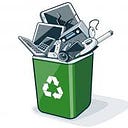Common Things About Electronic Recycling Everyone Should Understand
Electronic waste or e-waste is a term which is used to describe electronic products that are not in the working condition or are at the end of their life. The most common examples of the e-waste include components of computers like printers, monitors and other devices like microwaves.

Why electronic products should be recycled properly?
These electronic devices are one of the faster-growing products in the market. As these products have some toxic chemicals like mercury or cadmium, their presence damages the environment. According to the estimates of environmental protection agency, only fifteen to twenty percent of the waste is recycled and rest goes into landfills or illegally exported. Now due to this land pollution is increasing at a higher rate as these harmful chemicals also get mixed in the landfills.
Now when these electronic products are recycled in the yards, the harmful chemicals are removed from the waste. The components which can be repaired are repaired and are sold in the market. This way the land pollution decreases and the requirement of new products also decreases. This further affects the environment in a positive way as the depletion of new resources also decreases.
The data should be erased successfully: If any company or any individual wants to recycle the electronic products then they should first remove the data successfully. Leakage of the data can create problems as in case the data is related to the client then the reputation of the may get effected. Huge fines can also be imposed according to the severity of the data.
There are two most important standards followed for the recycling of electronics in the United States. To maintain the quality and to make sure there is no pollution every recycler has to go through the standard of the certification program. One standard is called an E-Stewards standard for responsible recycling and reuse of electronic equipment also called e-stewards and the other one is called as responsible recycling practices (R2). An individual should only choose the recycler who has any of the certifications just discussed
There are unwanted electronic items in almost every house. In the world of recycling, this pile is called the pile of denial. As people are not much aware of the benefits of national electronic recycling, this pile grows over time. This pile should be decreased as it can help the environment in a lot of indirect ways. The process of recycling should start quickly as electronic depreciation happens quickly

